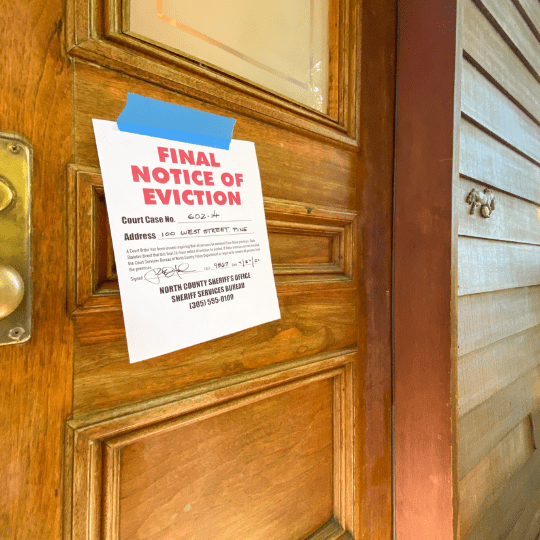Tampa, Florida Eviction Lawns
We Buy Tenant Occupied Houses in Any Condition & Pay Cash.
Learn How Our Home Buying Process Works & Get Your Offer. 💰

The Eviction Process in Tampa, Florida: Rules for Landlords
Evicting a tenant in Tampa, Florida, is a difficult and time-consuming process. The fact is that it involves a number of legal steps, which can be stressful and frustrating for landlords.
However, there are a number of things that you can do to make the process easier. In this article, we will break down the eviction process step-by-step, providing landlords with clear and concise guidance.
Tampa, Florida Eviction Process Explained
What are the Common Reasons for Eviction in Tampa, Florida?
First and foremost, every eviction must begin with a valid reason. So, in other words, it’s not a process that can be initiated at the whim of a landlord; there are legal grounds that must be established. Here, we delve into the common reasons that can legally substantiate an eviction in Tampa.
- Non-payment of rent: The most common reason for eviction is non-payment of rent. When a tenant fails to pay rent on time, it breaches the contractual agreement set out in the lease. Landlords must provide a notice to the tenant giving them an opportunity to pay the overdue rent typically within a specified period. This notice is typically called a 3-day Notice to Pay or Quit. If the tenant does not pay the rent by the deadline, the landlord can file an eviction lawsuit in court.
- End of lease or no lease: Another ground for eviction arises when a tenant continues to occupy the property after the lease has expired or in cases where there is no formal lease in place. In such cases, landlords are required to provide a notice for the tenant to vacate the property. This notice is typically called a Notice to Quit. Failure to comply with the notice can lead to eviction.
- Violating the lease terms: Violating specific terms of the lease is another common reason for eviction. This can include a range of issues, from unauthorized pets or occupants to illegal activities occurring on the property. As with the other eviction reasons, landlords are obliged to serve a notice to the tenant, offering them a chance to correct the violation. This notice is typically called a Notice to Comply. If the tenant fails to remedy the issue, the eviction process can proceed.
It is important to note that tenants have certain legal rights in Tampa. For example, tenants have the right to a hearing before a judge before they can be evicted. Tenants also have the right to request mediation or arbitration before the eviction process begins. If you are a tenant in Tampa and you are facing eviction, it is important to contact an attorney to discuss your legal options.
If you are a landlord in Tampa and you are considering evicting a tenant, it is important to follow the proper legal procedures. Otherwise, you may face legal challenges from the tenant.
Curable Violations: Tenants Have a Chance to Fix Their Mistakes
In the realm of evictions, not all lease violations are created equal, as some are considered “curable.” This means the tenant has a window of opportunity to correct their mistake to avoid eviction. It’s a grace period, so to speak, where the tenant can set things right. Here are some common examples:
Late Rent Payments
The most common curable violation is late rent payments. In these cases, landlords are required to provide a notice to the tenant that outlines the overdue amount and gives them a specified period, often three days, to pay up. If the tenant settles the overdue amount within this time frame, they can continue residing in the property without the threat of eviction.
Unauthorized Alterations
Making unauthorized alterations to the property is another common curable violation. If a tenant paints the walls a different color without permission or makes other unauthorized changes, the landlord must provide a notice to reverse those changes. If the tenant restores the property to its original condition in the given timeframe, the eviction process halts.
Exceeding Occupancy Limits
If a tenant has more people residing in the property than what’s allowed in the lease, that’s a curable violation. The landlord gives a notice, and the tenant has an opportunity to comply by ensuring the number of occupants aligns with the lease terms.
Incurable Offenses: Grounds for Immediate Eviction
However, on the other side of this, there are violations so severe that they are deemed “incurable.” These offenses don’t offer tenants the luxury of correction. Once committed, the landlord has grounds to initiate the eviction process immediately. These offenses include:
Repeated Violations
If a tenant repeatedly violates the terms of the lease, even if they correct each violation after receiving a notice, it can be considered incurable. This pattern of behavior demonstrates a disregard for the lease terms and can lead to eviction without the option for correction.
Serious Damage to Property
Causing serious damage to the property is another incurable offense. This isn’t about a hole in the wall or a broken window but significant damage that impacts the property’s value or safety. In these cases, the landlord can move forward with eviction, and the tenant doesn’t get the chance to repair the damage to avoid it.
Criminal Activity
Engagement in criminal activity on the property is a clear-cut, incurable offense. It poses safety and legal concerns that are grounds for immediate eviction. With this, the tenant is not given an opportunity to “cure” this violation, reflecting the severity of the offense.
The Eviction Process in Tampa, Florida
Evictions in Tampa can be tricky and are wrapped in legal red tape. Still, it’s a process every landlord needs to know, as it’s all governed by law. No worries, though! We’ve broken down the eviction steps below, making it easier to understand and navigate for property owners facing this situation.
Step 1: Providing Written Notice
This initial step is critical. Here, the landlord will need to provide the tenant with a written notice. The content and requirements of this notice will vary depending on the specific grounds for eviction. If it’s a case of unpaid rent, you’ll need to specify the amount due and give the tenant a set time, often three days, to settle the debt. If it’s a violation of lease terms, the notice should clearly outline the specific terms violated and provide an opportunity for correction. Ensure that the notice is clear and adheres to legal requirements to set a solid foundation for the process.
Step 2: Filing the Florida Eviction Lawsuit
If the tenant fails to respond adequately to the initial notice, the next action is on the landlord. You’ll need to file an eviction lawsuit with your local county court. This formal action is a signal that the tenant has not adhered to the initial notice’s requirements. Ensure all documents are accurately prepared and filed to avoid any potential delays or complications. Remember, each detail counts and can influence the outcome of the eviction process.
Step 3: Summons and Complaint are Served
Now, the tenant is served with a summons and a complaint, marking their official notification of the eviction lawsuit. At this point, they typically have five days to respond. This phase is crucial, so ensure the service is conducted according to legal standards to uphold the process’s integrity. If the tenant fails to respond, you can move to secure a default judgment for eviction, streamlining the next steps.
Step 4: Court Hearing and Judgment
If the tenant responds, a court hearing will be scheduled. This is your opportunity to present your case, and preparation is key. Arm yourself with all necessary documents and evidence, and adhere to legal protocols to bolster your position. The judge will deliver a judgment based on the presented facts. If it favors you, a Final Judgment of Eviction is issued, propelling the process to the next stage.
Step 5: Writ of Possession is Posted
With the Final Judgment of Eviction, the court issues a Writ of Possession. A sheriff typically posts this document at the property, serving as an official notification to the tenant of the impending eviction. The tenant is given a short window to vacate voluntarily, a grace period that underscores the legal adherence to tenants’ rights even amidst the eviction process.
Step 6: Property is Returned
The final step sees the tenant given one last chance to vacate the property voluntarily. If they fail to do so, the sheriff returns on the specified date to remove the tenant, effectively restoring possession of the property to the landlord. It marks the conclusion of the legal eviction process, underscoring the importance of each preceding step conducted with legal precision.
How Long Does Eviction Process Take in Tampa?
The eviction process in Tampa, Florida can take anywhere from weeks to months depending on the specific circumstances of the case. If the tenant does not contest the eviction, the process can be relatively quick. However, if the tenant contests the eviction, the process can be more protracted.
It is important to note that tenants in Tampa, Florida have certain legal rights. For example, tenants have the right to a hearing before a judge before they can be evicted. Tenants also have the right to request mediation or arbitration before the eviction process begins.
Can Tenants Delay an Eviction in Tampa?
There are a few things that tenants in Tampa, Florida can do to delay an eviction:
- Contest the eviction in court. Tenants have the right to a hearing before a judge before they can be evicted. During the hearing, the tenant can present evidence to challenge the landlord’s grounds for eviction.
- Request mediation or arbitration. Mediation and arbitration are alternative dispute resolution (ADR) processes that can be used to resolve landlord-tenant disputes without going to court. If the tenant and landlord are able to reach an agreement through mediation or arbitration, the eviction process can be halted.
- Negotiate with the landlord. The tenant may be able to negotiate with the landlord to resolve the underlying issue that led to the eviction notice. For example, if the tenant is facing eviction for non-payment of rent, the tenant may be able to negotiate a payment plan with the landlord.
- Seek financial assistance. There are a number of organizations that can provide financial assistance to tenants who are facing eviction. This assistance can help the tenant to pay their rent or other debts, which may prevent the eviction from proceeding.
Quick Tips to Expedite the Eviction Process in Tampa
Let’s face it; evictions can be a hassle, but they don’t have to drag on forever. There are practical, straightforward steps you can take to speed things up while still playing by the rules. Below are some clear, no-nonsense tips to help Tampa landlords move through the eviction process even quicker.
- Stay Organized: Keep all your tenant records, agreements, and communication logs tidy and at arm’s reach. When every piece of paper is where it should be, you won’t waste a second more than necessary.
- Know the Law: A little homework goes a long way. Brush up on the local eviction laws so you can tread confidently, avoiding the kind of missteps that can slow you down.
- Serve Notices Right: Delivering eviction notices isn’t just about dropping a piece of paper. Do it the right way, at the right time, to keep the ball rolling smoothly.
- Legal Backup: Think about bringing a lawyer into the loop. Yes, it’s an extra cost, but having legal help can streamline the steps and help sidestep pitfalls.
- Keep Talking: Don’t shut the door on communication with the tenant. Sometimes, a conversation can lead to a resolution faster than the formal route.
How to Lookup Eviction Records in Tampa, Florida
To look up evictions in Florida Tampa, you can follow these steps:
- Visit the Hillsborough County Clerk of Court website.
- Click on the “Case Search” link.
- Proceed to enter the tenant’s or landlord’s name in the “Case Name” field.
- Choose “Eviction” from the “Case Type” drop-down menu section of the website.
- Click the “Search” button.
By following these steps, you will be able to view all eviction cases filed in Hillsborough County. You can then proceed to click on the case number to view more information about the case, including items such as the case status, court dates, and any relevant documents.
Where to Find Tampa Eviction Forms Online
We’ve made it easy for you to find and download Tampa related eviction forms online at the Hillsborough County Clerk of Court website.
If you are a landlord, here is a list of the Tampa related forms you have access to.
- Notice to Quit
- Complaint for Eviction
- Summons
- Writ of Possession
- Affidavit of Service
- Motion for Default
- Final Judgment for Eviction
Most importantly, be sure to consultant with an attorney specializing in Florida eviction laws.
Say Goodbye to Tenant Troubles Fast By Selling Your House for Cash As-Is!
We get it – tenant issues can turn your rental property into a constant source of stress. But imagine if there was a way to wave those issues goodbye, not next month, not next week, but now. No drawn-out evictions, no legal hoops, just you stepping into a future free of property headaches.
That’s where we step in. As specialists in buying properties as-is, we’re not just a service but a lifeline for Tampa landlords. We handle all the intricacies, offering you a quick, straightforward transaction and an immediate release from ongoing tenant issues.
Why endure another day weighed down by the complexities of problematic tenants and evictions? A call to us is a step towards a streamlined, hassle-free future. Get your no-obligation quote and open the door to a world where property management stress is a distant memory. Your fresh start is waiting!
We Buy Tenant Occupied Properties All Over Tampa

Learn “How We Buy Houses” & Our Process
Step by step 100% transparent process explaining how we buy houses fast!

Meet the Team & Learn About Our Company
Discover the “Why” behind what we do & what makes our “We Buy Houses” company different.

Get a Fast, No Obligation Cash Offer Now!
Get a quick cash offer for your home by completing our form and we’ll get back to you right away 🙂
Get My Cash Offer
We buy houses in any condition. We won’t ask you to do any repairs or pay any fees. Request your cash offer today to get started!
What Type of Properties Do You Buy in Tampa?
We can buy all types of properties in Tampa, Florida, including:
- Single-family homes
- Multi-family homes
- Townhouses
- Condos
- Apartments
- Commercial properties
- Vacant land
We understand that selling a property can be challenging. That’s why we offer a fast and easy solution. We can buy your property for a fair cash price, even if it has back taxes. We will also handle all of the paperwork and closing costs, so you can sell your property with minimal hassle.
If you are looking for a way to sell your property quickly and easily, we encourage you to contact us today. We would be happy to answer your questions and make you a fair cash offer on your property.
Top Rated Local Cash Home Buyers in Tampa
Sell your house without making any repairs. We’ll purchase your home or condo as-is, allowing you to take what’s most important to you and leaving the rest for us to handle!

We’ll buy any home (yes, even an inherited house you’ve discovered is a hoarder house) and eliminate the headaches and stress associated with a traditional home sale.
We Buy Homes, Condos & Townhouses As-Is
We’ve got your back, helping you find the right way out, whatever your situation. Here are common reasons homeowners want to sell their house fast in Tampa, Florida.
Where We Buy Properties in Tampa

Looking to sell your property fast for cash in Tampa, Florida? We can help! We’re interested in buying properties of all types, from single-family homes to condos. Whether your property needs repairs or is in perfect condition, we’ll make you a fair cash offer.
Hillsborough County:
- Apollo Beach
- Balm
- Bloomingdale
- Brandon
- Carrollwood
- Cheval
- Citrus Park
- Dover
- East Lake-Orient Park
- Egypt Lake-Leto
- Fish Hawk
- Gibsonton
- Greater Northdale
- Keystone
- Lake Magdalene
- Lutz
- Mango
- New Tampa (University)
- Northdale
- Palm River-Clair Mel
- Pebble Creek
- Plant City
- Progress Village
- Riverview
- Ruskin
- Seffner
- Sun City Center
- Tampa
- Temple Terrace
- Thonotosassa
- Town ‘n’ Country
- Valrico
- Westchase
Hernando County
Sarasota County
Pinellas County:
- Clearwater
- Belleair
- Belleair Shores
- Belleair Beach
- Belleair Bluffs
- Dunedin
- Indian Shores
- Indian Rocks Beach
- Kenneth City
- Largo
- Madeira Beach
- North Redington Beach
- Oldsmar
- Redington Beach
- Redington Shores
- Seminole
- Safety Harbor
- South Pasadena
- St. Petersburg
- Tarpon Springs
- Treasure Island
Polk County:
Manatee County:
Pasco County









